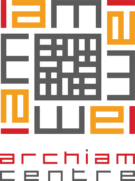Archiam Centre
|
The logo of ArCHIAM Centre | |
| Abbreviation | ArCHIAM |
|---|---|
| Formation | 2012 |
| Type | Research Center |
| Purpose | Research on India, Arabia and the Maghreb |
| Location | |
| Coordinates | 52°57′27″N 1°09′13″W / 52.957403°N 1.153503°W |
Region served |
Bangladesh India Sri Lanka Oman Middle East North Africa |
Director | Soumyen Bandyopadhyay |
Key people |
Giamila Quattrone Martin S. Goffriller Paul MacMahon Jonathan Wren Smaranda Ghinita |
| Affiliations | Nottingham Trent University |
| Website |
archiam-centre |
The Centre for the Study of Architecture and Cultural Heritage of India, Arabia and the Maghreb (ArCHIAM Centre), based at Nottingham Trent University, UK aims to provide an interdisciplinary research platform for historical and contemporary cultural developments across three interconnected global regions.
The Centre consists of an international team of researchers from a variety of academic backgrounds in architecture, social history, architectural technology, archaeology, conservation and digital documentation, among others. In this sense one of the fundamental themes underlying the Centre's research aims is the multidisciplinary study of how human culture and social practices are expressed spatially, and how in turn space affects the cultural practices of groups and communities.
Research
The centre is interested in furthering the study and understanding of influence and interconnectivity that existed between cultural spheres. Indian, Arabian and North African artistic developments never occurred in isolation from one another as traders, pilgrims and travellers shifted goods and ideas over great distances. These vast spatial cognitive networks that spanned, either directly or indirectly, from Marrakesh via Muscat to Madras, gave individuals and communities access to intellectual developments that lay far beyond their horizon.
Current research at ArCHIAM is emphasising the fieldwork based study of the built environment, its secular, vernacular and religious architecture and urbanism. The focus lies on heritage management and sustainable development in Arabia, the Subcontinent and North Africa, with a clear view towards incorporating studies in related fields in the arts and humanities and the social sciences. The Centre's spatial ambition is mirrored by its temporal interest ranging from pre-history to modernity.
Projects
For a number of years ArCHIAM team members have been involved in the ongoing study and documentation of heritage sites in the Middle East. By request of the Ministry of Heritage and Culture of the Sultanate of Oman a series of high-quality documentation efforts were carried out to ascertain the state of preservation of some of the country's most important architectural exponents, including the Bahla UNESCO World Heritage Site. Beyond the production of plans, drawings, photographs, virtual reconstructions and other materials of the highest standard, the ArCHIAM Heritage Management Plans aim for the development of sustainable re-integration strategies of the traditional vernacular architecture into the country's rapidly changing economic and social realities. To achieve this a strong emphasis is placed on the cooperation of local stakeholders and understanding the sensitivities and requirements of the inhabitants.
In keeping with the ArCHIAM mission statement, the study of anthropological substrates of the built environment and the spatial relationships within vernacular settlements figures very highly on our list of priorities. The members of the team pursue their individual research agendas in architectural technology, fortification, archaeology, tribal identities, conservation, etc., the results and conclusions being cohesively fed into the management plans and numerous ancillary scientific publications.
Dissemination and Outreach
ARCHIAM strives to provide high quality research materials for educational and public outreach programmes. ArCHIAM visualisations, plans and drawings are being displayed in a variety of museums and exhibitions on architectural history and vernacular architecture.
As part of fieldwork efforts undertaken in Oman, ArCHIAM team members have engaged with members of the community and trained students and ministry employees in survey techniques, photographic documentation and architectural analysis in order to build up local expertise and interest in the traditional lifestyles.
